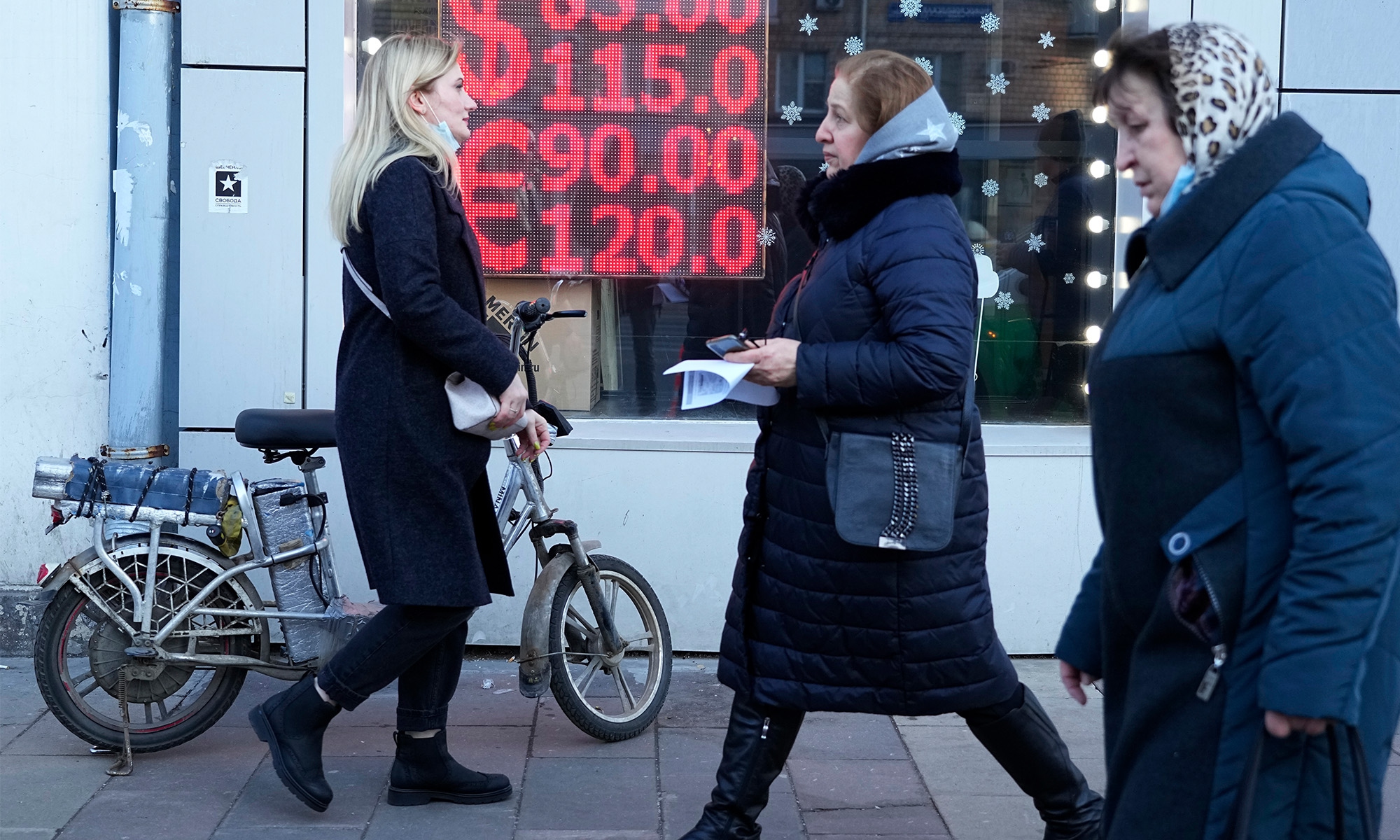EU’s internal divisions laid bare with gas payments to Russia in rubles; bloc faces dual pressure from Moscow, Kiev

People walk past a currency exchange office screen displaying the exchange rates of US Dollar and Euro to Russian Rubles in Moscow, on Febuary 28, 2022. Photo: VCG
About 20 European natural gas buyers have reportedly opened accounts to pay for Russian gas in rubles, which analysts said mirrors a dilemma the bloc is stuck in after echoing the US hegemony call - forcing Brussels to adopt a double-faced approach under which the government cast itself tough yet enterprises take a calibrated way to still do business with Russia.
As EU escalates sanctions against Russia with a sweeping oil ban plan, internal divisions in European countries as well as the Western group are further exposed, and now even Ukraine is doing a calculus, with a fresh move to take natural gas transferred via its territory as a bargain chip to ratchet up pressure on the West.
A total of 20 European companies have opened accounts in Gazprombank JSC, preparing to pay in rubles for Russian gas. Another 14 buyers have asked for the paperwork needed to set them up, Bloomberg reported on Thursday.
The move comes after European buyers have been struggling for weeks to figure out how they can pay for Russian gas in rubles as Moscow demanded and not fall afoul of EU sanctions.
Trying to bypass the restrictions, European buyers have to set up two accounts with Gazprombank to facilitate the transaction: one in a foreign currency and another in rubles.
The EU enterprises' move is in sharp contrast to EU officials who have said companies should keep paying in euros, and that opening a ruble bank account would violate sanctions imposed by the bloc.
Cui Hongjian, director of the Department of European Studies at the China Institute of International Studies, said the EU government and companies have reached a consensus on dealing with energy imports from Russia.
"The EU government seeks to make itself look tough, sending out strong signals. But from the enterprises' sphere, it's a technique issue on how to avoid sanctions but still buy natural gas from Russia," Cui told the Global Times on Friday.
The internal divisions among the EU also widened with a ban on Russian oil in its sixth round of sanctions against Moscow.
With Russia's counter-sanctions tools, the previous five rounds of EU sanctions against Russia have neither produced immediate harm on the latter's economy nor achieved the designed effect. So the sixth round focuses on oil imports - one of the biggest trading categories between Russia and the EU, hoping this could inflict massive harm on Russia.
However, to date, the EU sanctions plan has still drawn a backlash from a slew of EU countries.
Hungary said it would still block sanctions on Russian oil. The country gets 85 percent of its natural gas and more than 60 percent of its oil from Russia.
In addition to internal conflicts, it is also facing pressure from Russia and Ukraine, analysts said.
Ukraine said on Tuesday it would suspend the flow of gas through a transit point which it said delivers almost a third of the fuel piped from Russia to Europe through Ukraine, due to "force majeure," Reuters reported.
"The EU is in a dilemma. On the one hand, it risks serious retaliation from Russia if the sanctions proposal is pushed ahead, and in an extreme case, Russia could cut off natural gas supplies that will have broader implications for the EU economy," Cui said, adding that on the other hand, Ukraine is also using natural gas as a card to push Europe on further sanctions.
"The arrow is fitted to the string. But how to shoot the arrow, and its impact is still an issue," Cui said.
Analysts warned that the EU, which relies on around 37 percent of oil imports from Russia, would also bear the dire consequences of the sanctions.

